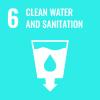Odesa, Ukraine – “Sometimes it felt like you could almost touch the flying missiles if you raised your hand,” Valentyna recalls of the intense hostilities in Mykolaiv, southern Ukraine, at the onset of Russia's full-scale invasion in 2022. Ironically, she lives on Myru Street – literally meaning “peace” in Ukrainian.
The water supply in Valentyna's village has been badly disrupted as shelling often caused power outages, disabling the pumps. However, even before the war escalated, residents often faced issues with water.
“The old pipes from the 1960s-1970s were heavily corroded, so for the past few years, there was almost no water flow,” says Valentyna. “My neighbours and I were lucky to have even a small trickle of water.”

Valentyna retrieves water from a well. Photo: IOM Ukraine/Stanislav Kalach
Recognizing the critical need to reestablish a stable water supply for residents of Shevchenkove, in 2023 IOM conducted pipeline repairs and installed 4,000 meters of new pipes, providing safe water access to over 1,200 people.

A resident of Shevchenkove village in Mykolaiv region now has access to tap water after IOM installed new pipes. Photo: IOM Ukraine/Stanislav Kalach
Having access to an adequate water supply at home has also allowed Valentyna to resume one of her most cherished pre-war occupations: gardening.
“I used to grow a lot of flowers before the war. However, when I had to leave home for several months at the beginning of the invasion, they didn’t survive my absence,” says Valentyna. “Now that I have a stable water supply again, I’ve returned to my hobby as a way to take my mind off things. It seems flowers can sense our anxiety and unrest these days, and they don’t grow as well as they used to.”

Valentyna at home, watering her tomatoes. Photo: IOM Ukraine/Stanislav Kalach
In addition to her job as an accountant, Valentyna also is active in the communal life of her village. Before the war, she initiated regular water analysis in her village. Previously, water analysis was conducted every six months, but she has now pushed for it to be done more frequently – every three months.
“We need to ensure that the water doesn't pose any threat to the residents of the village, especially during the hot season. Two months ago, we completed a project to implement a water filtration system in Shevchenkove,” Valentyna adds.


Mykolaiv residents collect potable water at an IOM water point. Photo: IOM Ukraine/Stanislav Kalach
Both rural areas of the region and cities like Mykolaiv suffered water issues due to the war. During the hostilities, the primary water transmission system from the Dnipro River was damaged. For weeks in February and March 2022, residents of Mykolaiv had no access to running water, relying on bottled water provisions from neighbouring regions. Since May 2022, saltwater has been pumped from a nearby estuary but can only be used as process water.
Residents of Mykolaiv avoid using tap water for cooking and drinking, relying primarily on water points to collect free potable water suitable for consumption. To support the region, IOM drilled boreholes and installed community water points. Each borehole is equipped with a reverse osmosis system that reduces the amount of dissolved salt in the water. In total, ten IOM water points are now operating in Mykolaiv region, providing clean and safe drinking water for over 4,000 people each day.


(Left) Reverse osmosis system installed at one of the water points in Mykolaiv. (Right) Installing new pipes for an old heating line in Mykolaiv. Photos: IOM Ukraine/Stanislav Kalach
However, saltwater poses another threat; being highly corrosive, it quickly ruins the pipes it runs through.
"We faced a tough choice: either stop the water flow to save the pipes and risk the sewer system failing or use salty water and corrode the pipes until a new system from the Pivdenyi Buh River is built," says Oleksandr Tsukanov, head of one of the districts of Mykolaiv City. This issue also affects the heating system, which uses the same water to transmit heat into residential houses.
IOM is currently finishing the installation of new pipes for an old heating line that was heavily damaged by saltwater. This will allow 160,000 people to have access to heat during the country's harsh winters.

A local resident carrying a water container in Snihurivka, Mykolaiv region. Photo: IOM Ukraine/Stanislav Kalach
Water and utility infrastructure have also suffered during the period of Russian occupation. Two out of the three sewer pumps in Snihurivka village, for instance, went out of commission. With only one functioning pump, the sewer pumping station was under significant strain and risked failing at any moment. IOM provided the local utility company with three pumps and specialized control panels just in time to prevent system collapse for the 2,000 residents of Snihurivka village.

Solar panels to power water pumps during blackouts. Photo: IOM Ukraine/Stanislav Kalach
Sustainability is another key concern in the region, given the significant energy deficit caused by frequent air attacks on electrical infrastructure. To address this, providing an alternative energy source for borehole pumps is crucial. In 2024, IOM provided six solar panel stations for the Mykolaiv region alone. These stations will power boreholes in the Snihurivka community, ensuring potable water access for nearly 2,000 residents.
Over a million people live in Mykolaiv region, among them 140,000 displaced from other parts of Ukraine. Access to clean drinking water is not just a necessity, but a fundamental human right that should be protected.
In southern Ukraine, the water crisis runs deep, exacerbated by both war and longstanding infrastructure issues. Significant efforts are required simply to maintain the current level of water access, and even more will be needed to make improvements. IOM is committed to addressing these challenges and supporting those most affected by the war.
For more information on IOM's work in Ukraine, visit the Strategic Response Plan for Ukraine and Neighbouring Countries 2024–2026 website.
Text and photos by Stanislav Kalach, IOM Ukraine.


